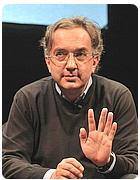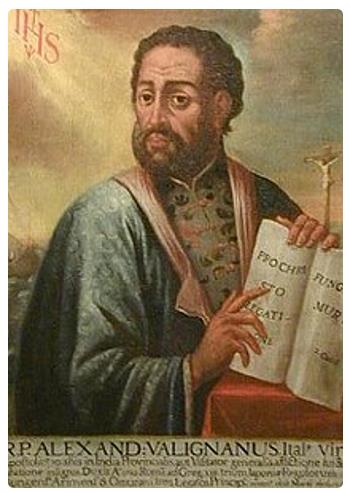|
Famous people of Chieti
Alessandro Valignano, Romualdo de Sterlich,
Pierluigi Zappacosta but also Ferdinando Galiani
and why not, Sergio Marchionne... What did they do for Chieti? Who
are they?
|
Among the famous personalities of Chieti is
Alessandro Valignano
(1538-1606) who was the man who consolidated the Jesuit
missionary commitment in India, Japan and China, which
Francis Xavier had begun. He worked there for 33 years. He
convinced Pope Gregory XIII to make the mission in Japan a
Jesuit mission exclusively because of the fact that the
Franciscan religious habit, as well as their unusual methods,
would give the impression that Catholicism was just as
fragmented as Buddhism. |
|
When the Franciscans arrived 23 years later they showed that
Alexander had not made a mistake, as they created a split in the
apostolate for their approach so different from the Jesuits.
They looked with contempt at Japanese culture, which the Jesuits
have admired very much. The Jesuits were much more cautious in
the distribution of articles such as rosaries that could have
led to superstition, while the Franciscans condemned the
intellectual approach of the Jesuits. The greatest fear of
Alexander came when the Spanish Franciscans were the fifth
column for a Spanish assault. This led to the great persecution
of 1597 together with 26 martyrs, including Franciscans and
Jesuits. During all this time, communication with Roma was
extremely slow. Alessandro's letter of 1589 arrived in Rome 17
years later, in 1607.
Alessandro, without the Roman instructions, knew how to use his
great authority and set up seminars, reorganized the mission. He
ordered intensive Japanese language studies. To finance these
changes, he was given permission by the Pope to invest in silk
trade with Macao. It was Alexander that the historical model as
Jesuit visitor in Shogun history.
Alexander's goal was not only to convert the Japanese to
Christianity, but to make Japan Christian, while he constantly
advised caution and prudence. At the same time his strategy has
always been to cultivate and, if possible convert the powerful
and thus to use their power, fame and influence to promote
Christianity. He considered the use of these means to be
legitimate for secular sacred purposes necessary. It was a
dangerous strategy and became more dangerous as successive
gentlemen, all of whom were disaffected by influences other than
their own, gradually moved on to omnipotence. Persecution has
continued for more than two and a half centuries. The only
Christian community that survived persecution was the one of
hidden Christians and their survival was surprising, because
there were no Christian samurai to lead them.
Alessandro was exasperated by the inaction of the local
superiors. In addition, it was Alexander more than anyone else,
who taught missionaries that becoming a follower of Christ does
not mean becoming a European or ceasing to be Japanese.
In 1614 Diego de Mesquita wrote about the Christians of
Japan:" There does not seem to be a Church in the whole of
Christianity that surpasses them, in fact, I consider them to be
the best in the world. They are a noble and rational people and
are strongly exposed to reason, and when they become Christians,
they begin to go to confession and live very well, paying much
attention to their souls. I eager to preserve our holy law, and
with a great desire for salvation, the correction of the vices
they had when they were pagans. "
Romualdo de Sterlich,
born in Chieti, where he returned to his twenties, great lover
of culture. He set up his own very rich personal library with
over 12,000 volumes that he wanted to make available to the city
of Chieti for its cultural growth. Unfortunately, upon his
death, the library was not taken care of and the volumes ended
up in several distant libraries. He was one of the first
Italians to read and comment on the works of Montesquieu,
Rousseau, Voltaire, and other European
Enlightenmentists. He actively participated in promoting
European Enlightenment culture. He was part of the Accademia
della Crusca and the Accademia dei Georgofili.
Romualdo de Sterlich died in Chieti in 1788 and was buried in
the Church of St. Francis of Paola.
Ferdinando Galiani
was a talented diplomat and intellectual; he was born in
Chieti while he lived and worked mainly in Naples. It is mainly
remembered for his writings on political economics, which
concern the theory of value in currency (1751). During his time
in Paris (1759-1769) as secretary of the Neapolitan ambassador,
he became a friend of prominent intellectuals, including Madame
d' Epinay, Diderot and d' Alembert. The correspondence, in
French, which began with them on his return to Naples, has a
literary merit and is of interest, in addition to being a
significant document of the Italian-French intellectual
relations. He also left some writings on Horace (1765), on the
Neapolitan dialect (1779), and on the functions of the princes
(1782).
Pierluigi Zappacosta
(manager) born in Chieti on July 2,1950, is CEO of Sierra
Sciences Inc., a biotechnology company and president of Digital
Persona, a biometrics company. He is also President of So, a
software development company for productivity tools. In 1981, he
was co-founder of Logitech. From 1981 to 1998 he held various
management roles, including the role of Chairman and CEO.
Logitech joined Nasdaq in 1997. Pierluigi attended the
University of Rome and obtained a degree in Electrical
Engineering, with honors. He attended Stanford University (MS in
Computer Science).
 Sergio
Marchionne (manager) was CEO of Fiat S. p. A. and Chrysler Group LLC.
When Fiat became managing director of the car manufacturer in 2004, it needed to
increase its production capacity and this was the objective it wanted to
achieve. Five years later, with Marchionne as manager, the car manufacturer
recovered its nail polish and also gained enough power to acquire the American
car manufacturer Chrysler. Sergio Marchionne took on the role of Chief Executive
Officer of both companies, when the purchase contract was authorised in 2009.
Sergio Marchionne was born in Chieti on 17 June 1952 into a family whose
patriarch was a member of the local police force. As a teenager, the family
moved to Canada, where he gained considerable credentials, becoming a lawyer and
accountant. He has also attended some of the best academic institutions in the
country, obtaining a degree in philosophy from the University of Toronto, an MBA
from the University of Windsor, and a degree in law from Osgoode Hall Law School
of York University. He began his career as an accounting and tax specialist for
the organization Deloitte Touche. In addition, Sergio Marchionne has imposed
himself and collaborated with several other prestigious companies until his
curriculum vitae has been studded with impressive work experience at
international companies. In addition to his position at Fiat and Chrysler,
Sergio Marchionne is also Chairman of SGS, which provides inspection and
certification services, as well as a member of the board of directors of UBS, a
global financial services company. Sergio
Marchionne (manager) was CEO of Fiat S. p. A. and Chrysler Group LLC.
When Fiat became managing director of the car manufacturer in 2004, it needed to
increase its production capacity and this was the objective it wanted to
achieve. Five years later, with Marchionne as manager, the car manufacturer
recovered its nail polish and also gained enough power to acquire the American
car manufacturer Chrysler. Sergio Marchionne took on the role of Chief Executive
Officer of both companies, when the purchase contract was authorised in 2009.
Sergio Marchionne was born in Chieti on 17 June 1952 into a family whose
patriarch was a member of the local police force. As a teenager, the family
moved to Canada, where he gained considerable credentials, becoming a lawyer and
accountant. He has also attended some of the best academic institutions in the
country, obtaining a degree in philosophy from the University of Toronto, an MBA
from the University of Windsor, and a degree in law from Osgoode Hall Law School
of York University. He began his career as an accounting and tax specialist for
the organization Deloitte Touche. In addition, Sergio Marchionne has imposed
himself and collaborated with several other prestigious companies until his
curriculum vitae has been studded with impressive work experience at
international companies. In addition to his position at Fiat and Chrysler,
Sergio Marchionne is also Chairman of SGS, which provides inspection and
certification services, as well as a member of the board of directors of UBS, a
global financial services company.
Back up
Ostelli Italia
Hotel a Chieti
Ostelli a Chieti
Carte Chieti
Karte von Chieti
Mapa Chieti
Map of Chieti
Carte Abruzzes
Karte von Abruzzen
Mapa Abruzos
Map of Abruzzi
Carte d'Italie
Karte von Italien
Mapa Italia
Map of Italy
イタリア の地図
|
